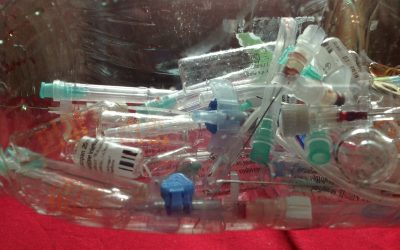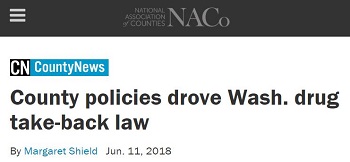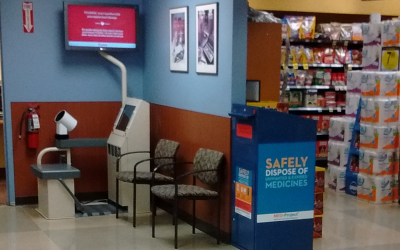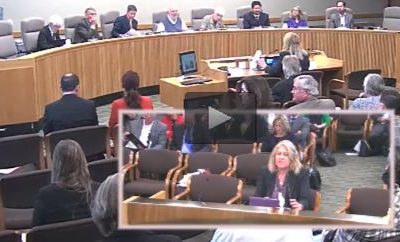Product Stewardship & Circular Economy
Extended Producer Responsibility Policies. Building a sustainable circular economy.How Community Environmental Health Strategies works to build a Circular Economy
- Working to enact effective extended producer responsibility policies, especially for toxic products that require special handling or disposal methods like pharmaceuticals, sharps, batteries, paint, and electronics.
- Designing and implementing product stewardship policy campaigns at the state and local levels.
- Providing expertise on model product stewardship policies that ensure consumer convenience and strong performance standards.
- Explaining how to avoid potential policy pitfalls and anticipate common stakeholder positions.
- Advocating for sustainable strategies and cradle-to-cradle systems.
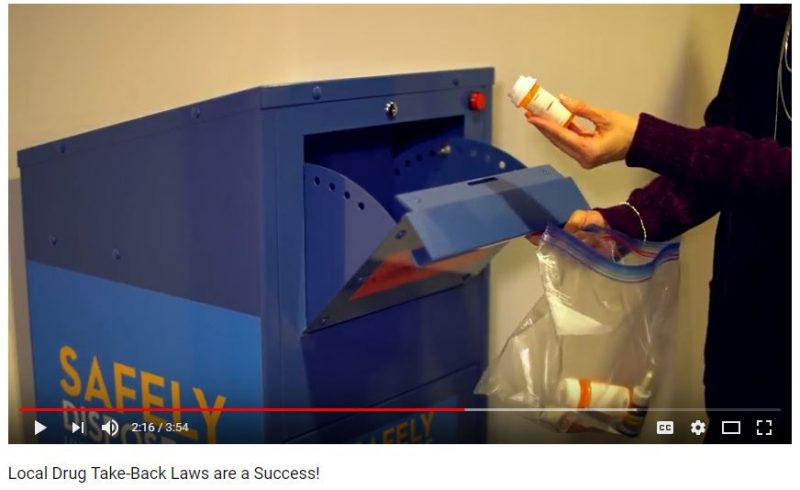
Pharmaceutical Stewardship
Local and state laws requiring the pharmaceutical industry to provide safe and environmentally sound drug take-back programs.
Margaret Shield, Principal, has worked extensively on drug take-back programs, pharmaceutical waste regulatory issues, and pharmaceutical stewardship policies at the national, state, and local levels since 2008. Margaret consulted on successful passage of 4 county-level ordinances in Washington State from 2015-2018. She played a leading role in the policy and advocacy campaign to pass Washington’s Secure Drug Take-Back Act in 2018 and provided policy and subject matter expertise during passage of Oregon’s similar law in 2019.

Sharps Stewardship
Safe disposal of medical sharps used outside of healthcare settings.
Led policy development for 2020 sharps stewardship legislation in Washington State HB 2360) to create a comprehensive statewide take-back system for sharps generated by residents. Conducted stakeholder discussions. Compiled and presented evidence base supporting policy change.

Mercury Lights Stewardship
Producer responsibility for CFLs, fluorescent tubes, and other mercury-containing lights.
Margaret Shield, Principal, was one of the lead policy developers and lobbyists responsible for passage of the 2010 mercury-containing lights stewardship law that created WA’s LightRecycle program while a policy liaison for a local government program. She led efforts to develop the evidence base that convinced legislators that lighting manufacturers should finance local government recycling programs and provide convenient retail take-back locations. This initiative required extensive analysis and communications about different financing mechanisms and consumer impacts.
FROM THE BLOG ON THIS TOPIC
It’s a Go! WA’s Statewide Pharmaceutical Stewardship Program Launched!
Washington State Celebrates the Official Start of the First Statewide, Comprehensive Drug Take-Back Program Operated by the Pharmaceutical Industry! A fitting subtitle is "good things come to those who organize and persist". It took many years of educating,...
The Sticky Problem of Safe Sharps Disposal
A worker sorting materials at a recycling facility feels a needle pierce their protective glove. Once again used syringes were tossed into a recycling bin by a confused or unaware resident. The recycling line is shut down while the worker is assisted and co-workers...
National Association of Counties article on WA drug take-back successes!
Thanks to NACo for helping share the news about successful pharmaceutical stewardship laws in Washington State. NACo County News published my article explaining how local policies served as innovative models and drove the adoption of WA's statewide law. ...
Local Pharmaceutical Stewardship Laws Achieve Their Promise
When counties in California and Washington state, like Alameda and King, began enacting pharmaceutical stewardship policies several years ago it was out of the compelling need to provide more medicine take-back services to their residents. Now in 2017, the robust and...
Why Secure Medicine Disposal? What’s Pharmaceutical Stewardship? my recent presentation
Last week in Salem Oregon, the state Legislature was holding work sessions on key policy issues. I was pleased to be invited by the Association of Oregon Counties to speak to the House Health Care Committee about secure drug take-back and pharmaceutical stewardship....

